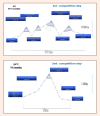Cell damage, antioxidant status, and cortisol levels related to nutrition in ski mountaineering during a two-day race
- PMID: 24149705
- PMCID: PMC3761741
Cell damage, antioxidant status, and cortisol levels related to nutrition in ski mountaineering during a two-day race
Abstract
The aim of this study was to measure the effect of nutrition on cell damage, antioxidant enzymes, and cortisol during a two-day ski mountaineering competition. Twenty-one male skiers participated in the study. Creatine kinase (CK), aspartate aminotransferase (AST), alanine aminotransferase (ALT), γ-glutamyl transpeptidase (GGT), lactate dehydrogenase (LDH), alkaline phosphatase (AP), cortisol and C-reactive protein (CRP), glutathione peroxidase (GPx) and reductase activities (GR) and C-reactive protein (CRP) levels, total antioxidant status, and cortisol levels were measured in serum the day before and immediately after the race. Their diet was also analysed during the competition. Enzymes and cortisol levels significantly increased after the competition. CK and LDH and cortisol levels were negatively correlated to total energy, protein, and fat intake. Intake of vitamin A, B1, B2, B6 and niacin was negatively correlated to LDH and AP. A negative correlation was also found between CK activity and Na, Fe, and Zn intake. Cortisol levels were negatively correlated to the intake of vitamins C, B1 and B2, and niacin. A positive correlation was found between serum GPx and intake of energy, carbohydrates, proteins, A and B vitamins, and folic acid. Skiers with the lowest nutrient intake during the competition were the ones who showed greater cell damage and lower antioxidant enzyme activity and cortisol levels, which may impair performance and also cause injuries and accidents. Particularly, skiers should have high intakes of total energy, macronutrients, vitamins A and B, Na, Zn, and Fe in order to decrease the deleterious effect of strenuous exercise. Key pointsA two-day ski mountaineering race produced muscle cell damage and oxidative stress and an increase in cortisol levels.There was a marked insufficient intake of carbohydrates which has been shown to affect performanceThose skiers with lowest nutrient intake showed greater cell damage, lower antioxidant activity and higher cortisol levels.Nutrition should be carefully monitored and assessed in order to minimize the mentioned blood changes to avoid fatigue, injuries and also accidents in this type of sport; particularly when skiers must carry their own food.
Keywords: Energy intake; antioxidant enzymes; micronutrients; muscle damage; skiing.
References
-
- Bloomer R.J. (2007) The role of nutritional supplements in the prevention and treatment of resistance exercise-induced skeletal muscle injury. Sports Medicine 37(6), 519-532 - PubMed
-
- Bloomer R.J., Fisher-Wellman K.H. (2008) Blood oxidative stress biomarkers: influence of sex, exercise training status, and dietary intake. Gender Medicine 5(3), 218-228 - PubMed
-
- Burke L.M., Loucks A.B., Broad N. (2006) Energy and carbohydrate for training and recovery. Journal of Sports Science 24, 675-685 - PubMed
-
- Cockburn E., Hayes P.R., French D.N., Stevenson E., Gibson A. (2008) Acute milk-based protein-CHO supplementation attenuates exercise-induced muscle damage. Applied Physiology, Nutrition and Metabolism 33(4), 775-783 - PubMed
LinkOut - more resources
Full Text Sources
Other Literature Sources
Research Materials
Miscellaneous

